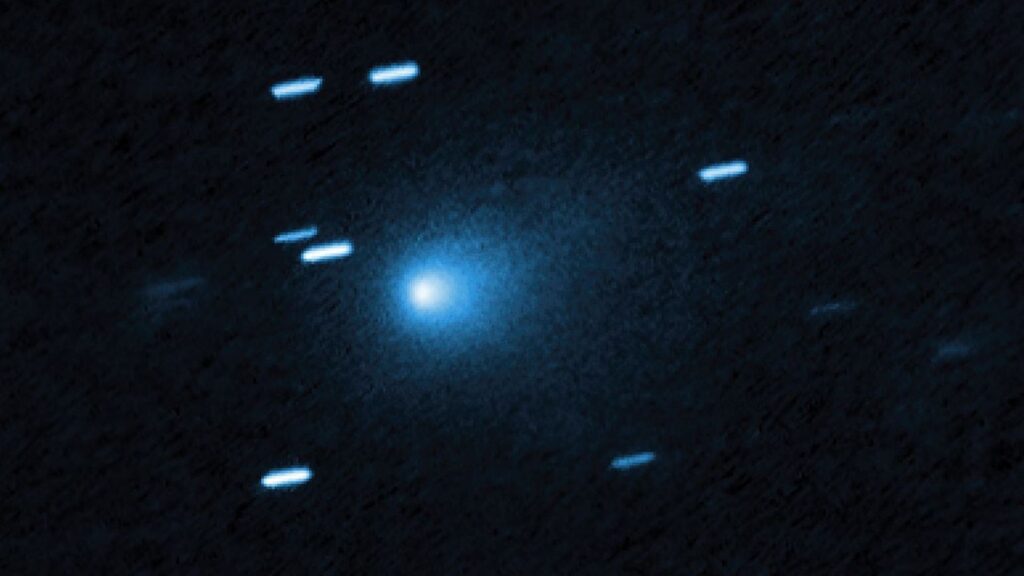On October 29th, comet 3I/ATLAS made its closest approach to the Sun.
This point, known as perihelion, was about 210 million kilometers from the Sun, or 1.4 times the distance between the Sun and Earth, and was on the opposite side of Earth from the Sun. This means that the sun was blocking the comet from our view (from Earth). Currently, ground-based telescopes are starting observations again.
you may like
When it was first detected by the Asteroid Terrestrial Alert System (ATLAS) on July 1, 2025, one of the first questions people had was, “But is it alien?”
This is not the first time the issue of aliens has come up in connection with new astronomical discoveries. But while it may be fun, it can also undermine real (and very good) science and fuel misinformation.
long history of speculation
Similar alien speculation arose when the first two interstellar objects, 1I/2017 U1 ‘Oumuamua and comet 2I/Borisov, were discovered.
And it doesn’t just happen to interstellar objects.
In 2019, I wrote my first public article about what I discovered while I was a PhD student. I discovered that radio light was emitted from a binary star system, and it was the first celestial object discovered with the MeerKAT telescope whose brightness changed over time. This had nothing to do with aliens, but the editor asked me to include speculation about aliens.
In 1967, Jocelyn Bell Burnell, then a doctoral student, discovered rapidly repeating flashes of radio light.
As a joke, she named it LGM 1 for “Little Green Men,” but the astronomers working on it never seriously believed they had discovered aliens. However, they were concerned that alien-related media coverage could sensationalize the discovery and impede scientific investigation.
you may like
7 billion year visitor
This concern remains with astronomers today.
Comet 3I/ATLAS is probably the oldest thing we’ve ever seen in our solar system. Our solar system formed 4.6 billion years ago, but recent research indicates that comet 3I/ATLAS may be more than 7 billion years old.
Much of that time was spent flying through space to spend several months in our solar system. When the comet reached perihelion, it was probably the closest it had been to its star in at least several million years.
Research shows that this comet’s outer layer contains more carbon dioxide than found in most comets in the solar system. Also, the ratio of nickel to other elements is higher than that seen in local comets.
These chemical signatures provide unique insight into the chemical composition of the gas cloud that formed the solar system from which the comet came.
This is one important reason why you should only ask about aliens when all other possibilities have been exhausted. If we talk about aliens first, you might miss all this amazing information.
As astronomer Carl Sagan said (paraphrasing French mathematician Pierre-Simon Laplace’s principle), “Extraordinary claims require extraordinary evidence.” It’s true that we still can’t fully explain all the details of the comet, but just because we don’t know everything doesn’t mean it’s alien.

watch on
embrace uncertainty
Talking about aliens also leaves room for misinformation to spread.
For example, there are claims that the orbit has changed and that comet 3I/ATLAS is “hidden” behind the Sun. Even though there is no evidence to support this, I received many questions along these lines when I talked about this comet online. This shows how easily misinformation can be generated and spread when talking about “aliens.”
There are several ways to see comets on the opposite side of the Sun. For example, the European Space Agency plans to observe comets using Mars Express, the ExoMars Trace Gas Orbiter, and the Jupiter Icy Satellites probe.
And if you want to look at the orbit of Comet 3I/ATLAS and find out where it is right now, you can.
There may be something to learn from poets here. Romantic poet John Keats wrote about what he called “negative capabilities.” It’s a strange name, but the concept is that you can live with “uncertainty, mystery, and questions” and be comfortable with not knowing.
There’s a lot we don’t know about Comet 3I/ATLAS and the universe. It wouldn’t be so fun to become an astronomer if we already knew everything. However, when something is unknown, we humans want to fill in the gaps.
When it comes to astronomical mysteries, the void tends to be filled with aliens. But just because we don’t know all the answers doesn’t mean we’re aliens. It just means we have a job to do.
This edited article is republished from The Conversation under a Creative Commons license. Read the original article.
Source link

